- Clone
- A20050B (See other available formats)
- Regulatory Status
- RUO
- Other Names
- CD273, Programmed cell death 1 ligand 2 (PD-L2), B7 dendritic cell molecule (B7-DC), Butyrophilin B7-DC, PDCD1 Ligand 2
- Isotype
- Rat IgG2b, κ
- Ave. Rating
- Submit a Review
- Product Citations
- publications
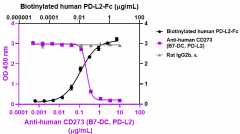
-

Biotinylated recombinant human PD-L2-Fc chimera (Cat. No. 785904) (black circles) binds to immobilized recombinant human PD-1 (CD279)-Fc chimera (Cat. No. 785106). Ultra-LEAF™ purified anti-human CD273 (B7-DC, PD-L2) (clone A20050B) (purple squares) inhibits the binding in a dose-dependent manner, whereas the GoInVivo™ purified rat IgG2b, κ isotype ctrl antibody (Cat. No. 400666) (gray triangles) does not have the effect. This antibody blocks the binding of 0.2 µg/mL biotinylated recombinant human PD-L2-Fc chimera to 1 µg/mL immobilized recombinant human PD-1 (CD279)-Fc chimera. ND50 range: 0.2 - 1 µg/mL.
| Cat # | Size | Price | Quantity Check Availability | Save | ||
|---|---|---|---|---|---|---|
| 947803 | 100 µg | £223 | ||||
| 947804 | 1 mg | £524 | ||||
PD-L2 is a type I transmembrane protein of 273 amino acids, and it is a member of the B7 family. Human PD-L2 has 70% amino acid identity to its mouse orthologue. PD-L2 is the second ligand for PD-1, and its binding to PD-1 leads to the inhibition of T cell receptor–mediated lymphocyte proliferation and cytokine secretion. PD-L2/PD-1 interaction suppresses immune responses against autoantigens and tumors and plays an important role in the maintenance of peripheral immune tolerance. Antibody blocking of PD-L2 on dendritic cells results in enhanced T cell proliferation and cytokine production. Interaction of PD-1 by PD-L1-Ig or PD-L2-Ig fusion protein has an inhibitory effect on proliferation and cytokine production during anti-CD3-mediated stimulation. PD-L2 is expressed in biopsies from human asthmatics and lungs of aeroallergen-treated mice and its expression correlates with the asthma severity. In vivo blockade of PD-L2 reduces the severity of allergen-driven airway hyperresponsiveness (AHR). Blockage of PD-L2 induces the IL-12 production by DC; IL-12 may limit the severity of allergen-induced AHR antagonizing IL-13. In addition, blockade of PD-1 does not have effect on AHR; therefore, PD-L2 controls asthma severity in a PD-1 independent manner. PD-L2 binds to a second receptor, RGMb (repulsive guidance molecule b) which is expressed in lung interstitial macrophages and alveolar epithelial cells and is a co-receptor for bone morphogenetic proteins BMP2/4. Blockade of the RGMb/PD-L2 interaction significantly impaired the development of respiratory tolerance since the initial T cell expansion is inhibited.
Product DetailsProduct Details
- Verified Reactivity
- Human
- Antibody Type
- Monoclonal
- Host Species
- Rat
- Immunogen
- Recombinant human PD-L2 (B7-DC, CD273)-Fc chimera
- Formulation
- 0.2 µm filtered in phosphate-buffered solution, pH 7.2, containing no preservative.
- Endotoxin Level
- Less than 0.01 EU/µg of the protein (< 0.001 ng/µg of the protein) as determined by the LAL test.
- Preparation
- The Ultra-LEAF™ (Low Endotoxin, Azide-Free) antibody was purified by affinity chromatography.
- Concentration
- The antibody is bottled at the concentration indicated on the vial, typically between 2 mg/mL and 3 mg/mL. Older lots may have also been bottled at 1 mg/mL. To obtain lot-specific concentration and expiration, please enter the lot number in our Certificate of Analysis online tool.
- Storage & Handling
- The antibody solution should be stored undiluted between 2°C and 8°C. This Ultra-LEAF™ solution contains no preservative; handle under aseptic conditions.
- Application
-
Block - Quality tested
- Recommended Usage
-
Each lot of this antibody is quality control tested by blocking the binding of 0.2 µg/mL biotinylated recombinant human PD-L2-Fc chimera (Cat. No. 785904) to 1 µg/mL immobilized recombinant human PD-1 (CD279)-Fc chimera (Cat. No. 785106). ND50 range: 0.2 - 1 µg/mL. It is recommended that the reagent be titrated for optimal performance for each application.
- RRID
-
AB_2894535 (BioLegend Cat. No. 947803)
AB_2894535 (BioLegend Cat. No. 947804)
Antigen Details
- Structure
- Dimer
- Distribution
-
Immature dendritic cells, mature dendritic cells, subset of macrophages, placental endothelium, and medullary thymic epithelial cells
- Function
- Inhibits T cell mediated proliferation and cytokine production by CD4+ T cells. Regulate T cell responses. PD-L2 expression is up-regulated on antigen-presenting cells by IFN-γ.
- Interaction
- Antigen-stimulated T and B cells, regulatory T cells, follicular T and B cells, dendritic cells, monocytes
- Ligand/Receptor
- PD-1 (CD279), RGMb
- Cell Type
- Antigen-presenting cells, Dendritic cells, Epithelial cells, Macrophages, Plasma cells
- Biology Area
- Apoptosis/Tumor Suppressors/Cell Death, Cell Proliferation and Viability, Immunology
- Molecular Family
- CD Molecules, Immune Checkpoint Receptors, Soluble Receptors
- Antigen References
-
- Latchman Y, et al. 2001. Nat. Immunol. 2:261.
- Brown JA, et al. 2003. J. Immunol. 170:1257.
- Youngnak P, et al. 2003. Biochem. Biophys. Res. Commun. 307:672.
- Singh AK, et al. 2011. Allergy. 66:155.
- Lewkowich IP, et al. 2013. Mucosal. Immunol. 6:728.
- Xiao Y, et al. 2014. J. Exp. Med. 211:943.
- Bardhan K, et al. 2016. Front Immunol. 7:550.
- Gene ID
- 80380 View all products for this Gene ID
- UniProt
- View information about CD273 on UniProt.org
Related FAQs
- Do you guarantee that your antibodies are totally pathogen free?
-
BioLegend does not test for pathogens in-house aside from the GoInVivo™ product line. However, upon request, this can be tested on a custom basis with an outside, independent laboratory.
- Does BioLegend test each Ultra-LEAF™ antibody by functional assay?
-
No, BioLegend does not test Ultra-LEAF™ antibodies by functional assays unless otherwise indicated. Due to the possible complexities and variations of uses of biofunctional antibodies in different assays and because of the large product portfolio, BioLegend does not currently perform functional assays as a routine QC for the antibodies. However, we do provide references in which the antibodies were used for functional assays and we do perform QC to verify the specificity and quality of the antibody based on our strict specification criteria.
- Does BioLegend test each Ultra-LEAF™ antibody for potential pathogens?
-
No, BioLegend does not test for pathogens in-house unless otherwise indicated. However, we can recommend an outside vendor to perform this testing as needed.
- Have you tested this Ultra-LEAF™ antibody for in vivo or in vitro applications?
-
We don't test our antibodies for in vivo or in vitro applications unless otherwise indicated. Depending on the product, the TDS may describe literature supporting usage of a particular product for bioassay. It may be best to further consult the literature to find clone specific information.
Other Formats
View All CD273 Reagents Request Custom Conjugation| Description | Clone | Applications |
|---|---|---|
| Ultra-LEAF™ Purified anti-human CD273 (B7-DC, PD-L2) Antibody | A20050B | Block |
| APC anti-human CD273 (B7-DC, PD-L2) | A20050B | FC |
| PE anti-human CD273 (B7-DC, PD-L2) | A20050B | FC |
| PE/Cyanine7 anti-human CD273 (B7-DC, PD-L2) | A20050B | FC |
Customers Also Purchased
Compare Data Across All Formats
This data display is provided for general comparisons between formats.
Your actual data may vary due to variations in samples, target cells, instruments and their settings, staining conditions, and other factors.
If you need assistance with selecting the best format contact our expert technical support team.
-
Ultra-LEAF™ Purified anti-human CD273 (B7-DC, PD-L2) Antibody

Biotinylated recombinant human PD-L2-Fc chimera (Cat. No. 78... -
APC anti-human CD273 (B7-DC, PD-L2)
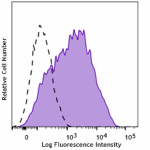
Human monocyte-derived dendritic cells were stained with ant... -
PE anti-human CD273 (B7-DC, PD-L2)
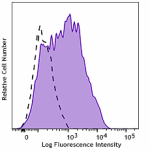
Human monocyte-derived dendritic cells were stained with ant... -
PE/Cyanine7 anti-human CD273 (B7-DC, PD-L2)
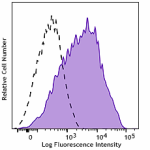
Human monocyte-derived dendritic cells were stained with ant...
 Login / Register
Login / Register 






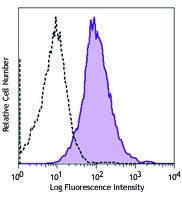
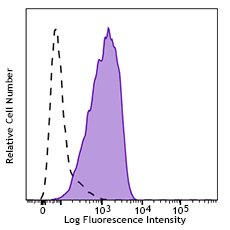
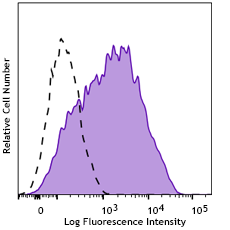
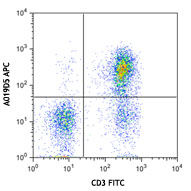



Follow Us